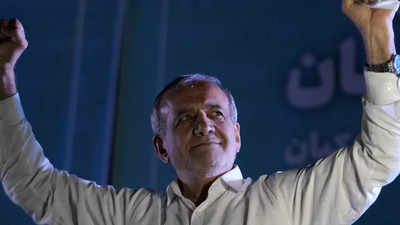- News
- World News
- Middle East News
- Reformist Masoud Pezeshkian elected Iran president: How it will impact Tehran's ties with India
Trending
Reformist Masoud Pezeshkian elected Iran president: How it will impact Tehran's ties with India

NEW DELHI: Masoud Pezeshkian, Iran's only reformist candidate in the latest presidential election, has risen from relative obscurity to become the ninth president of the Islamic republic. The 69-year-old won around 53.6% of the vote in a runoff election against the ultraconservative Saeed Jalili.
Pezeshkian's victory has raised the hopes of Iran's reformists after years of dominance by the conservative and ultraconservative camps, but his ascension is unlikely to significantly impact Tehran's bilateral ties with New Delhi in the near term.
Shortly after Iran's announcement, Prime Minister Narendra Modi congratulated Pezeshkian.
Sanctions and crude oil
While Pezeshkian has pledged to open Iran to the world and deliver more freedoms, he has also recognised Supreme Leader Ayatollah Ali Khamenei as the ultimate authority on state matters.
Pezeshkian's moderate stance and advocacy for limited reforms may lead to some changes in Iran's domestic policies, such as relaxing enforcement of the compulsory headscarf law. However, his ability to enact major shifts in Iran's foreign policy is constrained by the fact that the government remains largely controlled by hard-liners.
That said, Pezeshkian's victory could signal a gradual shift towards more moderate voices in Iran's political landscape. If this trend continues, it may create opportunities for India to engage with Iran on a wider range of issues in the future as western nations, especially the US, may consider rolling back some sanctions.
As one of India's key sources of crude oil, Iran may also look to increase oil exports to India, potentially offering more favorable terms amid ongoing Western sanctions
Chabahar port & trade routes
India and Iran have maintained relatively stable ties in recent years, with both countries cooperating on issues like the development of the Chabahar port and connectivity projects like the International North-South Transport Corridor (INSTC), a multi-modal transportation route connecting India to Russia via Iran.
Pezeshkian is expected to maintain and deepen India-Iran economic ties, with a particular focus on the strategic Chabahar port project that is important for India's connectivity to Afghanistan and Central Asia. He is likely to build on the existing cooperation and investments in this project.
Pezeshkian's victory has raised the hopes of Iran's reformists after years of dominance by the conservative and ultraconservative camps, but his ascension is unlikely to significantly impact Tehran's bilateral ties with New Delhi in the near term.
Shortly after Iran's announcement, Prime Minister Narendra Modi congratulated Pezeshkian.
"Looking forward to working closely with you to further strengthen our warm and long-standing bilateral relationship for the benefit of our peoples and the region," PM Modi said in a post on X.
Sanctions and crude oil
While Pezeshkian has pledged to open Iran to the world and deliver more freedoms, he has also recognised Supreme Leader Ayatollah Ali Khamenei as the ultimate authority on state matters.
Pezeshkian's moderate stance and advocacy for limited reforms may lead to some changes in Iran's domestic policies, such as relaxing enforcement of the compulsory headscarf law. However, his ability to enact major shifts in Iran's foreign policy is constrained by the fact that the government remains largely controlled by hard-liners.
That said, Pezeshkian's victory could signal a gradual shift towards more moderate voices in Iran's political landscape. If this trend continues, it may create opportunities for India to engage with Iran on a wider range of issues in the future as western nations, especially the US, may consider rolling back some sanctions.
As one of India's key sources of crude oil, Iran may also look to increase oil exports to India, potentially offering more favorable terms amid ongoing Western sanctions
Chabahar port & trade routes
India and Iran have maintained relatively stable ties in recent years, with both countries cooperating on issues like the development of the Chabahar port and connectivity projects like the International North-South Transport Corridor (INSTC), a multi-modal transportation route connecting India to Russia via Iran.
Pezeshkian is expected to maintain and deepen India-Iran economic ties, with a particular focus on the strategic Chabahar port project that is important for India's connectivity to Afghanistan and Central Asia. He is likely to build on the existing cooperation and investments in this project.
- The Chabahar Port is a project to which India has already committed heavy investments. Chabahar is an important transit point for trade with Afghanistan and Central Asia, bypassing Pakistan.
- India has pledged $120 million for the development of the Shahid-Beheshti Port terminal at Chabahar and offered a $250 million credit line for infrastructure projects in Iran.
- New Delhi sees the Chabahar port project as a way to "de-risk" commerce between India and Eurasia.
Other key ways India-Iran ties may change under Pezeshkian
- Improved diplomatic ties: Pezeshkian's more moderate and pragmatic approach compared to his hardline opponents like Saeed Jalili, who he has defeated, is likely to further strengthen Iran's relations with India. Political experts said Pezeshkian is someone "world powers are likely to welcome, hoping he might pursue peaceful ways out of a tense standoff with Iran".
- Potential for economic opportunities: If Pezeshkian is able to secure sanctions relief, it could create new economic opportunities for India to engage with Iran, particularly in areas like trade, investment, and energy cooperation.
- Improved people-to-people ties: Pezeshkian's pledges to ease social restrictions and promote political pluralism could pave the way for greater people-to-people exchanges and cultural cooperation between Iran and India.
- Uncertainty over Ayatollah Khamenei's successor: Pezeshkian's role in selecting the next Supreme Leader could be crucial, as this decision will shape Iran's future direction and its relations with India in the long term.
End of Article
FOLLOW US ON SOCIAL MEDIA











